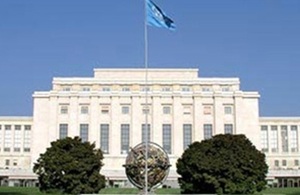Working Group on Arbitrary Detention Consultation
UK's Opening Statement by Ambassador Karen Pierce at the Working Group consultation, 1 September 2014.

The UN Working Group on Arbitrary Detention is taking place at the Palais des Nations, Geneva
Thank you Mr Chair Person, for inviting me to the Working Group’s consultation today to contribute with a few opening remarks. The Working Group will complete its Guiding Principles and Guidelines in 2015. This is coinciding with the 800th anniversary of the Magna Carta, which first codified habeas corpus.
The UK celebrates the 800th anniversary of the Magna Carta on 15 June 2015. We plan to make this anniversary a celebration and an opportunity to debate widely the continuing importance of protecting human rights and strengthening the power of the citizen and the power of the legislature against the Executive.
Magna Carta was the first general statement of rights in England, and three clauses remain in force to this day:
Clause 1 confirms the liberties of the Church of England and of all freemen of the realm.
Clause 9 confirms the liberties of the City of London and other cities, towns and ports.
And Clause 29 reads: “No Freeman shall be taken or imprisoned, or be disseised”— which means unlawfully dispossessed— “of his Freehold, or Liberties, or free Customs, or be outlawed, or exiled, or any other wise destroyed; nor will We not pass upon him, nor condemn him, but by lawful judgment of his Peers, or by the Law of the Land. We will not deny or defer to any man either Justice or Right.”
Protection from arbitrary detention was a principle enshrined again in the UK’s Bill of Rights enacted in 1689, which is the only formal Bill of Rights that the UK country has ever had. The key elements are as relevant today as they were then: that Parliament should be frequently summoned and that there should be free elections; that Members and peers should be able to speak and act freely in Parliament; that no army should be raised in peacetime and that no taxes be levied without the authority of Parliament; that laws should not be dispensed with or suspended without the consent of Parliament; and that: “excessive bail ought not to be required, nor excessive fines imposed, nor cruel and unusual punishments inflicted”.
The Magna Carta and the Bill of Rights are the two laws that British people regard as the bedrock of the UK’s civilisation and our deeply-held belief in democratic values and the rights of the citizen.
Today, this has developed into the UK’s robust framework which protects human rights, prevents arbitrary arrests and holds national security organisations to account. This framework is made up of a comprehensive body of legislation regulating the work of all law enforcement, security and Intelligence agencies, as well as treaty obligations, oversight bodies and binding guidance on British personnel.
In particular we would like to bring the panel’s attention to the following:
The prohibition of torture, or inhuman or degrading treatment or punishment, and the right to liberty and security as guaranteed by the European Convention on Human Rights are directly enforceable in UK courts through the Human Rights Act 1998.
An extensive body of legislation, such as the Police and Criminal Evidence Act (1984), and Codes of Practice based on that Act, provides a statutory framework against arbitrary arrests.
The UK is also party to a range of international human rights instruments including the ECPT, CAT and OP-CAT, which ensure that UK state detention facilities are regulated and monitored. The UK ratified the OP-CAT in 2003. The UK’s National Preventative Mechanism is made up of 20 independent bodies, with Her Majesty’s Inspectorate of Prisons acting as their coordinator. The UK’s Mechanism was established in 2009. A review of its first five years of operation was the subject of a major conference, addressed by Ministers from the Ministry of Justice in April this year. This level of attention demonstrated the importance which the UK attaches to the National Preventative Mechanism.
The rights and protections of the citizen that have been stated since the Magna Carta will continue to be enshrined in British law. It is striking that clause 29 of the Magna Carta – drafted 800 years ago - goes right to the heart of the vital and continuing work of the UN Working Group on Arbitrary Detention. I welcome the Working Group’s consultation today on this important topic.
Thank you, Mr Chair Person.